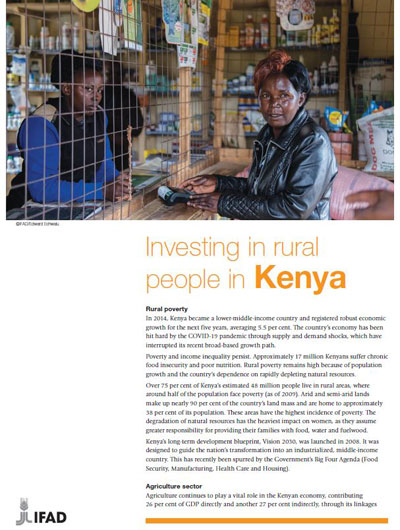Investing in rural people in Kenya
Investing in rural people in Kenya
Since 1979, IFAD has invested US$455.09 million in 20 programmes and projects in Kenya (at a total cost of US$980.31 million), in support of the Government’s efforts to reduce rural poverty.
In Kenya, IFAD loans provide support to smallholders and value chain actors (such as agrodealers, private extension services, small traders and processors) in the dairy sector, aquaculture, livestock and cereal value chains. In addition, they strengthen the resilience of the natural resource base and improve access to rural financial services.
The country strategic opportunities programme (COSOP) for 2020-2025 has three strategic objectives:
- Improve climate-resilient and sustainable community-based natural resource management.
- Improve access to productivity-enhancing assets, technologies, rural finance and services.
- Enhance sustainable access to improved post-production technologies and markets.
In the past, IFAD activities concentrated on rural areas with medium-to-high productive potential, where most of Kenya’s poor people live. Under the new strategy, IFAD is extending support to the country’s arid and semi-arid areas. This shift supports the Government’s commitment to improve small-scale irrigation, community resilience, extension services, marketing and access to financial services in areas with high poverty rates. The emphasis is on a market-oriented approach in the sectors of horticulture, dairy production, cereal commodities and rural finance. In addition, IFAD recently began supporting the Government’s new priority through diversification to smallholder aquaculture value chain development. This aims to support the country’s fishery and blue economy agenda.
